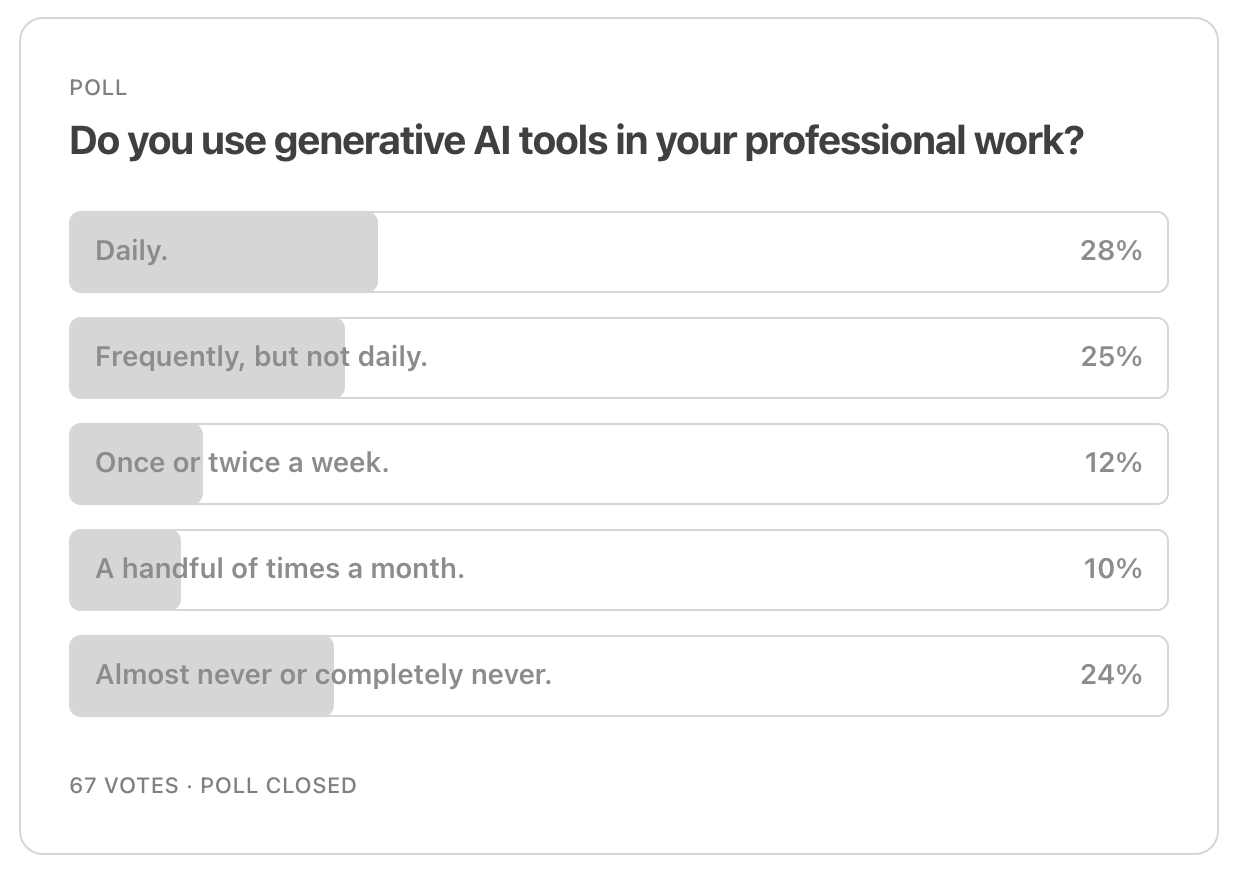Issue 148
🕷️🦹 Who is Scattered Spider? Europe tightens the reins on social media giants. Andreessen Horowitz's Generative AI Report.
Dear Readers,
Before we get into our usual fun stuff this month, I wanted to ask you if you could set aside a minute to take a 7-question multiple choice survey.
Since we have now grown to over 10,000 people (thank you for subscribing!), we want to make sure that we’re delivering you more of what you like, and maybe less of what you don’t like. This brief survey will take you less than a minute to complete and will help us get to know you and your interests. That way we can bring you even better content in the future. Thank you in advance. And with that said...
Here are this month’s headliners:
🕷️🦹 Who is Scattered Spider?
🇪🇺🛑 Europe Tightens the Reins on Social Media Giants
📊🤖 Andreessen Horowitz's Generative AI Report
Happy reading and have a wonderful week!
📰 From the Newsroom
🕷️🦹 Who is Scattered Spider?
A group of young Gen-Z hackers known as Scattered Spider has been creating havoc across various industries with their adept social engineering tactics and technical expertise. Their recent assault on major casinos has left cybersecurity professionals astounded, as their level of sophistication mirrors that of professional nation-state actors rather than youthful hackers orchestrating attacks from their parents' basements. Examples of advanced tactics they’ve successfully used include:
SIM swapping, a tactic where they convinced mobile service providers to transfer victims’ phone numbers to SIM cards they controlled, which allowed them to bypass two-factor authentication and gain unauthorized access to the victim's accounts.
Once they had access, they would would call up a target company’s information technology help desk, posing as the employee who’s credentials they stole. They would then ask for login details by pretending to have lost theirs, and because they had all of the stolen information about the employee, they were able to sound convincing.
The final step, after gaining access, was to locate the company's most sensitive repositories, steal classified or proprietary data, and demand a ransom. In other words - extortion.
They've also collaborated with ALPHV, a larger group, to organize and execute sophisticated attacks, exemplifying a new level of organized cyber criminality. This partnership amplifies the threats posed by Scattered Spider, representing a dangerous trend of collaboration among cybercriminal groups. Where will they strike next? 🤔
🇪🇺🛑 Europe Continues to Crack Down on Social Media Giants
In a digital realm often marred by privacy invasions, Europe continues its stern vigilance to uphold user privacy. The recent enforcement of fines by regulators in both Norway and the European Union, reinforce that this is not just an E.U. effort, but a continent-wide effort (as Norway is not an E.U. member).
Last month, Norway instituted a ban on Meta and their products (Facebook and Instagram) due to their deceptive advertising practices. Meta faces a “coercive fine” of up to 1 million Norwegian kroner (nearly $100,000) each day if they continue to operate inside the country. This fine was upheld recently by a Norwegian court despite Meta's efforts to challenge it.
Earlier in the year, Meta’s WhatsApp chat app was slapped with a €5.5 million fine by Europe’s Data Protection Commission (based in Ireland) for forcing users to allow personal data to be used to provide “service improvements and security”.
That same Irish Data Protection Commission just issued a hefty fine of €345 million to Tik-Tok, after an investigation revealed that the social media giant violated children’s privacy rights during the sign-up process.
These fines signal a wider regulatory crackdown, as Europe has been taking a hardline approach to ensure social media giants comply with stringent data protection and advertising laws. On the flip side, these companies have enormous amounts of capital at their disposal. This naturally makes you wonder whether the fines will be enough to get them to change their practices, or if they’ll just shrug it off as part of “operating expenses”.
📊🤖 Andreessen Horowitz's Generative AI Report
Well-known venture capital firm Andreessen Horowitz recently examined SimilarWeb traffic data (as of June 2023) to analyze consumer interactions with generative AI products. They were able to compile a list of the top 50 GenAI web products according to monthly visits. Here are some of the most fascinating numbers that stood out from their research:
ChatGPT dominates the list, garnering 60% of the monthly traffic, leaving the other 49 websites with the remaining 40%. Its popularity also makes it the 24th most visited website globally.
While general LLM chatbots hold 68% of total consumer traffic, emerging categories like AI companions and content generation tools are gaining traction.
A striking 90% of the 50 companies on the list are monetizing their products mainly through a subscription model, with an average monthly earning of $21 per user, reflecting a higher consumer willingness to pay for generative AI compared to other online tools.
This is merely a glimpse into the report's extensive analysis. With many more intriguing insights on generative AI and consumer behavior, diving into the full report is highly recommended for a comprehensive overview. 📖
⛓️ Ten Must See Links of the Month
MIT has developed a machine-learning system, utilizing light instead of electrons for computations, achieving over a 100-fold enhancement in energy efficiency and a 25-fold increase in computing density compared to existing systems.
Researchers discovered that jellyfish can alter their behavior based on past experiences despite lacking a brain, showcasing a form of learning previously observed only in more complex animals.
The U.S. Department of Defense is collaborating with Google on an AI-powered Augmented Reality Microscope (ARM) to aid pathologists in identifying cancerous cells in tissue samples swiftly, with the technology showing promise in early testing but not yet deemed ready for clinical use.
Engineers at the University of California San Diego have designed flexible sensors that can be attached to earbuds to record brain electrical activity and body lactate levels, offering a portable solution for long-term health monitoring.
A Japanese pharmaceutical startup is developing a pioneering drug aimed at growing new teeth. The team will commence clinical trials in 2024 to ensure the drug's safety, following successful trials on animals, and aims to expand its application to children and adults facing tooth loss.
Scientists have created “GlowTrack”, a non-invasive movement tracking method that employs fluorescent dye markers to train AI, making the tracking of human and animal movement more time-efficient and precise, with potential applications in biology, robotics, and medicine.
A new study by researchers at NYU Grossman School of Medicine, in collaboration with 25 hospitals, found that some cardiac arrest patients revived by CPR retained clear memories of experiencing death, with their brain patterns showing activity linked to thought and memory even an hour after cardiac arrest.
📽️🎞️ Launched in 1984, Apple's Macintosh is lauded for pioneering a user-friendly era in computing. However, it's significantly indebted to its lesser-known predecessor, Lisa. Despite being on the market for only two years, Lisa’s clever interface design left a footprint that is still felt today.
Have you ever heard of visual regression testing? If you run at least one website and you care about its performance, then you should read this intro guide to familiarize yourself with regression testing (including how to do it).
North Korean hackers, impersonating Meta recruiters on LinkedIn, tricked employees at a Spanish aerospace company into downloading malware by offering fake job challenges. This cyber-espionage attempt aimed to possibly advance North Korea's aerospace and nuclear ambitions.
🎤 It’s How They Said It
"Things aren’t always #000000 and #FFFFFF.”
– Author Unknown
🧮 The Numbers Game
12.54% of new online job postings in the U.S. advertised remote work opportunities as of January 2023.
2,654 U.S. workers were polled in September 2023 and 50% of them stated that a fully remote job is at least “somewhat important” to them. 24% said it’s “very important.”
16.4% of the U.S. workforce is made up of gig workers.
⚒️ Tools and Resources
ChatGPT.js: ChatGPT.js is a robust client-side JavaScript library aimed at facilitating easy interaction with the ChatGPT DOM. It's designed to be feature-rich, object-oriented, easy to use, and lightweight, while ensuring optimal performance. The library supports various import methods and is crafted for ultra flexibility, allowing diverse call-to-fetch responses. It has been utilized in several applications, such as tools for auto-clearing ChatGPT query history, sending DAN prompts to ChatGPT, and displaying ChatGPT answers in search engine sidebars.
Otter Blocks: Otter Blocks is a WordPress plugin offering a collection of Gutenberg blocks and a page builder to enhance the Block Editor and Full Site Editing (FSE) experience. With its new AI blocks feature - as highlighted in a press release - users can now leverage artificial intelligence within their workflows, providing a modern, streamlined approach to content creation and website design. This innovation aligns Otter Blocks with contemporary web development trends, offering a user-friendly tool for building engaging, dynamic websites.
https://wordpress.org/plugins/otter-blocks/
🖼️ Image of The Month
What do you see below?
A group of people wearing similar pea coats and walking in the street?
Anything else?
If it’s not readily apparent, you’re probably looking at the image too closely. The fastest way to immediately see the subliminal logo of this famous clothing brand is to save it or screenshot it and then look at the thumbnail. You’ll see it right away.
What this actually is, is a cool new image editing trick that harnesses the power of Stable Diffusion and a plugin called ControlNet. If you want to learn how to create images like this, check out the subliminal message/how to hide text in images video tutorial here.
💬 Word of The Month
"Poka-yoke" (ポカヨケ) is a Japanese term that translates roughly to "mistake-proofing" or "error prevention." Originating from lean manufacturing practices in Japan, poka-yoke is a design philosophy centered around preventing inadvertent errors by designing systems that either prevent the mistake from occurring or immediately highlight it when it does.
In the realm of technology and web development, poka-yoke can be thought of as embedding safeguards or checks in our systems, ensuring seamless operation. This could be a piece of code that anticipates user errors and gently guides them back on track, or a design element that prevents users from making common mistakes.
What’s the take away here? 🤔
Well, the next time you're coding an interface or designing a user journey, consider the essence of poka-yoke and think about how you can proactively prevent mistakes from happening. Both your users and your tech support team will be forever grateful to you.
📊 Results of Last Month’s Polls
Unsurprisingly, more than half of us use generative AI in our work frequently. Based on the Andreessen Horowitz report we covered above, it’s likely that a good percentage of that number can be attributed to ChatGPT.
However, since the data for that report was compiled, the popular chatbot has been seeing a steady decline in its user base every month. We’re still very much at the beginning of this though. Remember that 80% of the top 50 generative AI companies did not exist a year ago today. One thing is for certain though: However the trends continue to evolve, AI is definitely here to say.
Thanks for reading! If this is the first time you're here at Bizarro Devs and you enjoyed the content, then sign up here to get all future editions.
Until next time,
– Martin



The suspense built in moto x3m through segments without checkpoints keeps players fully engaged https://moto-x3m.io/